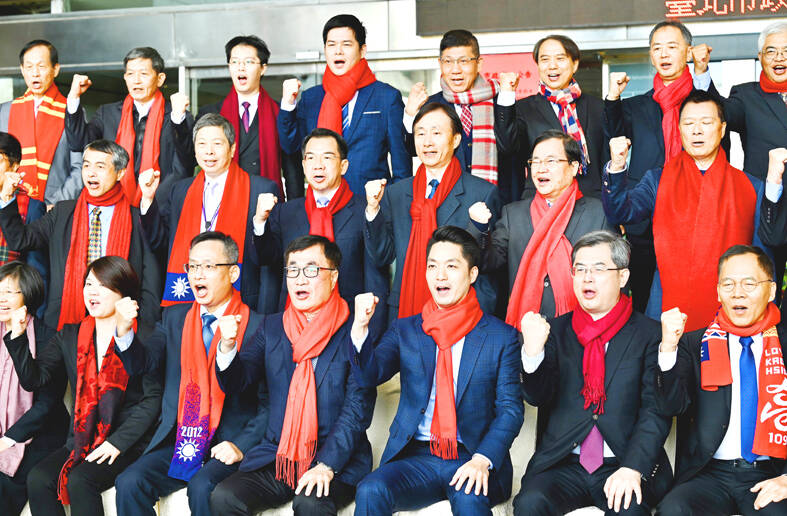Chiang Wan-an (蔣萬安) of the Chinese Nationalist Party (KMT) took office as Taipei mayor yesterday, pledging to deal with the long-drawn out Taipei Dome problem, traffic congestion in Neihu District (內湖) and urban renewal issues as soon as possible.
At an inauguration ceremony at Taipei City Hall in the morning, Ko Wen-je (柯文哲) stepped down after eight years as mayor and handed the mayor’s seal over to Chiang, the youngest Taipei mayor ever elected.
It was Taipei’s eighth inauguration ceremony to swear in a mayor.

Photo: Lo Pei-de, Taipei Times
Ko said he advised Chiang’s administrative team that when facing tough choices, they should imagine themselves looking back to the present from 50 years in the future and the answer would be clear.
Ko said he hopes Chiang and his administrative team would uphold honesty and integrity in governance.
Most importantly, they should not sacrifice long-term interests for short-term ones, nor sacrifice the majority’s interests for those of a few people, or sacrifice national interests for party interests, he said.
The Taipei City Council in June passed self-governance regulations to achieve net zero emissions by 2050, which would be an important task for Chiang, he said.
In his inaugural address, Chiang said he has taken on the important task of guiding Taipei forward.
He understands that amid competition from international cities and facing an ever-changing global situation, a city that does not move forward would fall behind, so he would always strive to be better, Chiang said.
His team would pursue “four windows of opportunity”: making Taipei a prosperous city; making it a city where talented people would be willing to stay and could pursue creative endeavors; renewing Taipei to make it a modern city with more environmentally friendly buildings; and promoting Taipei’s local features and urban tourism to make it a charming city with cultural heritage, he said.
Chiang said he would meet with city departments to understand their needs and collect their opinions, and enable administrative operations to run smoothly.
He would speed up the handling of the Taipei Dome project, the Neihu traffic problem and urban renewal issues, he said.
Chiang reiterated his promise to finish the Taipei Dome construction project within a year of taking office, as well as resolve traffic congestion that has long been a serious concern for Neihu residents.
He has also pledged new urban renewal policies to Taipei residents, so he must get to work as soon as possible, Chiang said.
Newly elected and re-elected mayor and county commissioners nationwide were also sworn in yesterday.

Taiwan has received more than US$70 million in royalties as of the end of last year from developing the F-16V jet as countries worldwide purchase or upgrade to this popular model, government and military officials said on Saturday. Taiwan funded the development of the F-16V jet and ended up the sole investor as other countries withdrew from the program. Now the F-16V is increasingly popular and countries must pay Taiwan a percentage in royalties when they purchase new F-16V aircraft or upgrade older F-16 models. The next five years are expected to be the peak for these royalties, with Taiwan potentially earning

STAY IN YOUR LANE: As the US and Israel attack Iran, the ministry has warned China not to overstep by including Taiwanese citizens in its evacuation orders The Ministry of Foreign Affairs (MOFA) yesterday rebuked a statement by China’s embassy in Israel that it would evacuate Taiwanese holders of Chinese travel documents from Israel amid the latter’s escalating conflict with Iran. Tensions have risen across the Middle East in the wake of US and Israeli airstrikes on Iran beginning Saturday. China subsequently issued an evacuation notice for its citizens. In a news release, the Chinese embassy in Israel said holders of “Taiwan compatriot permits (台胞證)” issued to Taiwanese nationals by Chinese authorities for travel to China — could register for evacuation to Egypt. In Taipei, the ministry yesterday said Taiwan

‘LIKE-MINDED PARTNER’: Tako van Popta said it would be inappropriate to delay signing the deal with Taiwan because of China, adding he would promote the issue Canadian senators have stressed Taiwan’s importance for international trade and expressed enthusiasm for ensuring the Taiwan-Canada trade cooperation framework agreement is implemented this year. Representative to Canada Harry Tseng (曾厚仁) in an interview with the Central News Agency (CNA) said he was increasingly uneasy about Ottawa’s delays in signing the agreement, especially as Ottawa has warmed toward Beijing. There are “no negotiations left. Not only [is it] initialed, we have three versions of the text ready: English, French and Mandarin,” Tseng said. “That tells you how close we are to the final signature.” Tseng said that he hoped Canadian Prime Minister Mark Carney

Taiwan is awaiting official notification from the US regarding the status of the Agreement on Reciprocal Trade (ART) after the US Supreme Court ruled US President Donald Trump's global tariffs unconstitutional. Speaking to reporters before a legislative hearing today, Premier Cho Jung-tai (卓榮泰) said that Taiwan's negotiation team remains focused on ensuring that the bilateral trade deal remains intact despite the legal challenge to Trump's tariff policy. "The US has pledged to notify its trade partners once the subsequent administrative and legal processes are finalized, and that certainly includes Taiwan," Cho said when asked about opposition parties’ doubts that the ART was